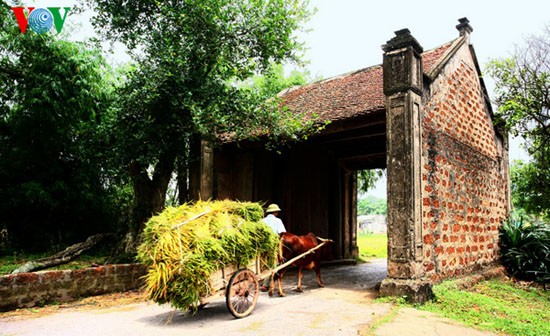(VOVworld) – Vietnam’s cultural treasure boasts the laws of folk customs. Village regulations are distinctive, reflecting people’s compliance with the community.
 |
| The gate of Duong Lam village on the outskirts of Hanoi |
In Vietnam’s history, customary law is the writing of mandatory rules related to the lives of the village community. These rules have been amended when necessary. In the Tran dynasty in the 17th century, customary law was quite popular, regulating security, order, behaviors, the public interest, punishment and rewards, filial duty, and other moral norms. Many customary laws imposed taboos and severe punishment. However, there were many incentives which remain relevant today. The 100-year-old customary law of Nhat Tan village in Hanoi states: “To provide children with primary education is the obligation of parents, with objection to any resistance”. The 1906 customary law of Phu Xa Doai village on the outskirt of Hanoi stipulates: “Children aged 5 and 6, boys and girls alike, are obliged to go to school. Parents who fail to send their children to schools and leave them to be naughty should be fined with a sum of money of 3 haos and 10 areca nuts”. Many traditional customary laws which regulate citizens’ responsibilities to make contributions to their villages and hamlets are still maintained today. 81-year-old Tran Hong Duc of Hanoi told VOV: “In my home village of Quan Xuyen, Thanh Cong commune, Khoai Chau district, Hung Yen province, the customary law says a girl who gets married and moves to live far away has to donate 500 bricks to build her home village’s road. Although this law is no longer valid now, villagers are called to contribute a certain sum of money towards village development. Thanks to these contributions, our village has been recognized as a new cultural village”.
Village regulations today exist along side the State legal system. Some opinions suggest limiting the effects of customary laws. But folklore researcher Doctor, Professor Ngo Duc Thinh says even State laws extract some provisions from the customary laws, so they are not contradictory but supplementary:“I think State laws are universal, while village regulations are local. So we should legalize village regulations by conveying the State laws’ ideas in the form of village regulations. In fact, village rules on building new rural areas are already included in law”.
In recent years, the movement to build a healthy lifestyle in residential areas initiated by the Vietnam Fatherland Front has been incorporated into the movement to build new rural areas. The fronts have advised the authorities to make supplements to customary laws in residential areas. Under the Vietnam Fatherland Front’s proposal, the people discuss and compile village regulations which will be approved by the local authorities based on consensus regarding the positive points of traditional village regulations. Rules regarding weddings, longevity anniversaries and funerals in rural areas have been positively responded to by the people.